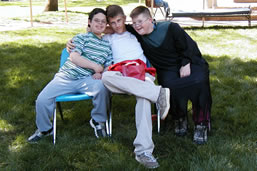Friendships
and Social Life
The issues of friendships and
social life are almost universal concerns among adolescents with developmental
disabilities. Teens who are disabled are more dependent on their parents for many
life activities than their typically-developing peers. This dependence extends
to activities such as telephone use, friendships, social events, and leisure activities.
All too often, the adolescent with Down syndrome is involved in spectator events
with relatively little physical, social, or self-actualizing activity. As Roy
Brown states so clearly, "It is essential that a stimulating environment
with broad-ranging activities in leisure be increased over the years." (Brown,
1995, p. 46)
Brown goes on to say that
some social activities and environments are more effective than others in promoting
friendships. Political action, singing, acting, social dancing, special interest
groups, and religious organizations provide excellent opportunities for friendship.
On the other hand, many teens with Down syndrome participate in events that
are less suitable for forming friendships: mall walking, shopping, spectator
sports, and bowling. (Brown, 1999)
 Needless
to say, the type of activity and the setting selected also guides the type of
friendships that may spring up. An adolescent with Down syndrome who participates
in inclusive events, such as a religious youth group, will have more opportunities
for friendships with typically-developing peers. A teen who spends time only
in events or groups designed for individuals with disabilities will naturally
make friendships within that group. Even within special needs settings, there
may be distinctions between settings for teens with physical challenges and
environments for adolescents with cognitive impairments. These decisions are
highly personal ones, to be made by the teen and other family members.
Needless
to say, the type of activity and the setting selected also guides the type of
friendships that may spring up. An adolescent with Down syndrome who participates
in inclusive events, such as a religious youth group, will have more opportunities
for friendships with typically-developing peers. A teen who spends time only
in events or groups designed for individuals with disabilities will naturally
make friendships within that group. Even within special needs settings, there
may be distinctions between settings for teens with physical challenges and
environments for adolescents with cognitive impairments. These decisions are
highly personal ones, to be made by the teen and other family members.
Nurses who work with youths
with Down syndrome can serve a valuable function by guiding teens and parents
toward the environments that provide a chance to make friends. The nurse can
also discuss the preferences of the teen and the family for inclusive settings
versus activities for individuals with disabilities. Knowing the youth’s
interests, strengths, and abilities, the nurse can share ideas about particular
clubs or social events.
INSTANT
FEEDBACK:
Social
dancing, special interest groups, and religious organizations offer good opportunities
for the teen with Down syndrome to make friends.
RnCeus.com
 Needless
to say, the type of activity and the setting selected also guides the type of
friendships that may spring up. An adolescent with Down syndrome who participates
in inclusive events, such as a religious youth group, will have more opportunities
for friendships with typically-developing peers. A teen who spends time only
in events or groups designed for individuals with disabilities will naturally
make friendships within that group. Even within special needs settings, there
may be distinctions between settings for teens with physical challenges and
environments for adolescents with cognitive impairments. These decisions are
highly personal ones, to be made by the teen and other family members.
Needless
to say, the type of activity and the setting selected also guides the type of
friendships that may spring up. An adolescent with Down syndrome who participates
in inclusive events, such as a religious youth group, will have more opportunities
for friendships with typically-developing peers. A teen who spends time only
in events or groups designed for individuals with disabilities will naturally
make friendships within that group. Even within special needs settings, there
may be distinctions between settings for teens with physical challenges and
environments for adolescents with cognitive impairments. These decisions are
highly personal ones, to be made by the teen and other family members.